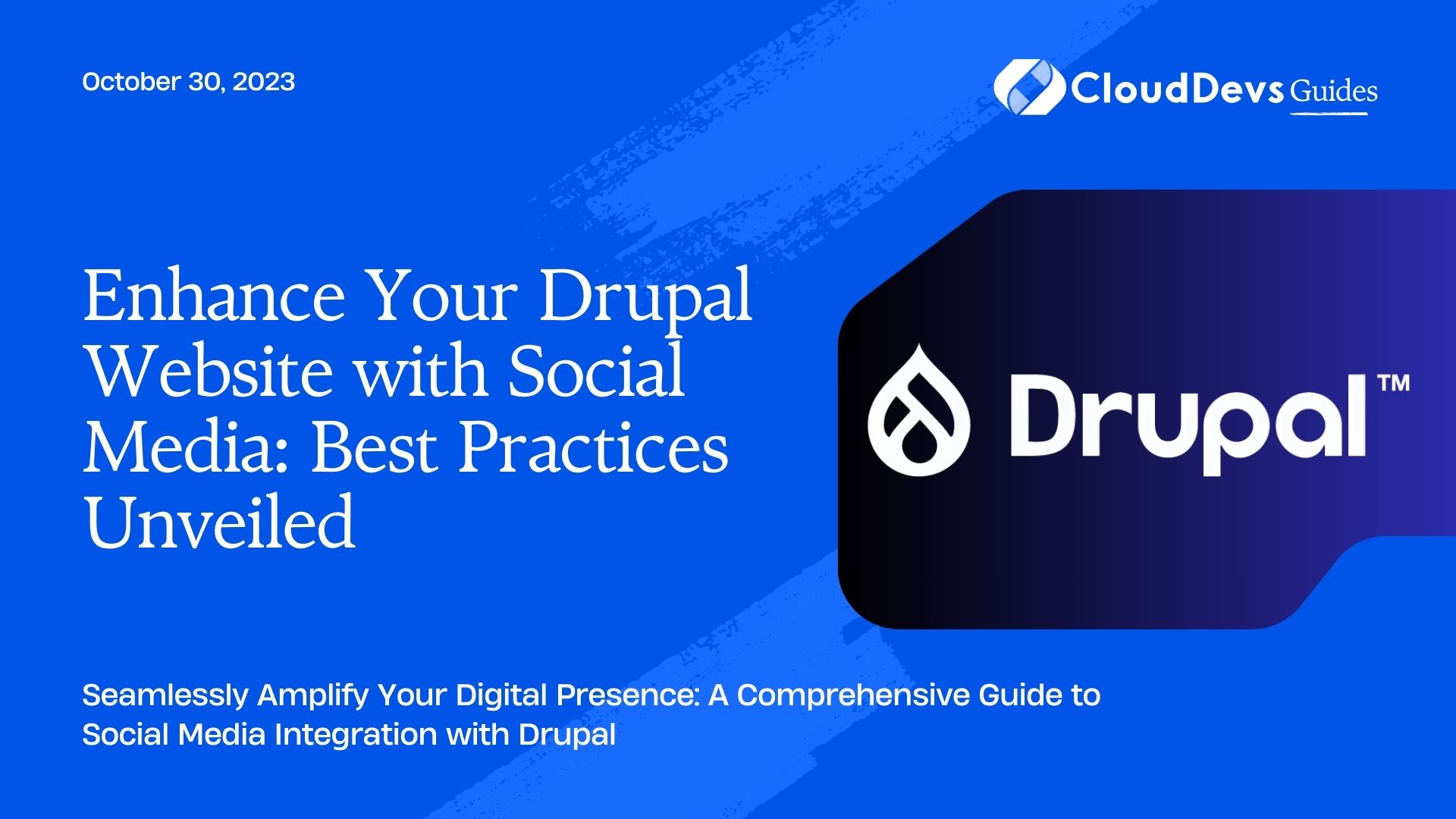Enhance Your Drupal Website with Social Media: Best Practices Unveiled
In today’s digital landscape, social media has become an integral part of our daily lives. For businesses and organizations, it’s no longer an option but a necessity to have a strong presence on popular social media platforms. Integrating social media into your website is a strategic move that can enhance your online presence and engage your audience effectively. Drupal, a powerful and flexible content management system, provides an ideal platform for seamless social media integration. In this blog post, we will explore the benefits of leveraging Drupal for social media integration and provide examples of how you can do it effectively.

1. Why Social Media Integration Matters
Before diving into the technical aspects, it’s essential to understand why integrating social media with your Drupal website is so crucial.
- Wider Reach: Social media platforms have billions of active users, making them an excellent channel for reaching a broader audience. Integrating social media into your Drupal site allows you to tap into this massive user base.
- Increased Engagement: Social media integration enables you to interact with your audience in real-time. You can share updates, respond to comments, and run contests or promotions, fostering a sense of community around your brand.
- Improved SEO: Social signals, such as likes, shares, and comments, can positively impact your website’s search engine ranking. By integrating social media, you encourage users to engage with your content, which can boost your site’s visibility on search engines.
- User Convenience: With social media integration, users can easily share your content with their social networks. This can lead to organic word-of-mouth marketing and drive more traffic to your website.
Now, let’s explore some ways Drupal facilitates social media integration.
2. Drupal and Social Media Integration
Drupal’s flexibility and robust architecture make it an excellent choice for integrating social media into your website. Here are some examples of how you can leverage Drupal for social media integration:
2.1. Social Media Login
Allow users to log in or register on your Drupal site using their social media accounts. This simplifies the registration process and reduces friction for users. Drupal offers modules like “Social Auth” that support popular social platforms like Facebook, Twitter, and Google. Users can log in with their social credentials, and their profile information can be automatically imported into Drupal.
2.2. Social Sharing Buttons
Make it easy for visitors to share your content on social media by adding social sharing buttons to your Drupal site. You can use modules like “AddToAny Share Buttons” or “Social Media Links Block” to place sharing icons on your articles, blog posts, or product pages. When users click these buttons, they can quickly share your content on their preferred social platforms.
2.3. Social Feeds Integration
Display your social media feeds directly on your Drupal website to keep your audience updated with your latest posts and activities. Modules like “Feeds” and “Social Feed” allow you to import and display social media content seamlessly. You can create custom blocks or pages to showcase your Twitter, Facebook, or Instagram feeds.
2.4. Social Comments
Enable social media commenting on your Drupal site to encourage user engagement. Modules like “Social Comments” allow users to comment using their social media profiles, which can reduce the barrier to participation. Social comments can also increase the visibility of your content on social networks as they appear in users’ feeds.
2.5. Auto-Posting to Social Media
Automate the process of sharing your website’s content on social media by using modules like “Social Media Auto Publish.” With this integration, new blog posts, news articles, or updates can be automatically shared on your organization’s social media profiles, saving you time and ensuring your audience stays informed.
2.6. Social Media Analytics
Track the performance of your social media integration efforts with the help of analytics tools. Drupal modules like “Google Analytics” and “Social Media Tracking” can provide insights into how users interact with your social sharing buttons, social login, and social comments. This data can help you refine your social media strategy and content.
3. Real-World Examples
To illustrate the power of Drupal for social media integration, let’s look at a few real-world examples:
Example 1: An E-commerce Store
Imagine you run an online store built on Drupal. By integrating social media, you can allow customers to log in with their social accounts, share product pages on their social networks, and even display an Instagram feed showcasing user-generated content featuring your products. This approach can boost customer engagement, increase sales, and enhance your brand’s online presence.
Example 2: A Nonprofit Organization
A nonprofit organization using Drupal can leverage social media integration to raise awareness about its causes. By implementing social sharing buttons on blog posts and success stories, they can encourage supporters to spread the word. Additionally, integrating social comments can foster discussions about critical issues, while displaying social media feeds can showcase the organization’s ongoing projects and community involvement.
Example 3: A News and Media Outlet
A news website can utilize Drupal’s social media integration to stay competitive in the digital age. Readers can easily log in using their social accounts, share breaking news articles, and engage in discussions through social comments. Auto-posting to social media ensures that the latest headlines reach a broader audience quickly. Social media analytics help the news outlet track which stories resonate the most with their readership.
Conclusion
Leveraging Drupal for social media integration is a smart move for businesses, organizations, and content creators alike. The benefits, including expanded reach, increased engagement, improved SEO, and user convenience, are substantial. By implementing social media login, sharing buttons, social feeds, comments, auto-posting, and analytics, you can create a cohesive online presence that maximizes the impact of your Drupal website.
Remember that social media integration is an ongoing process. Regularly monitor your social media performance, stay updated with new Drupal modules and features, and adapt your strategy to changing trends and user preferences. With Drupal’s flexibility and the right social media integration tools, you can effectively connect with your audience and thrive in the digital landscape.
Table of Contents






